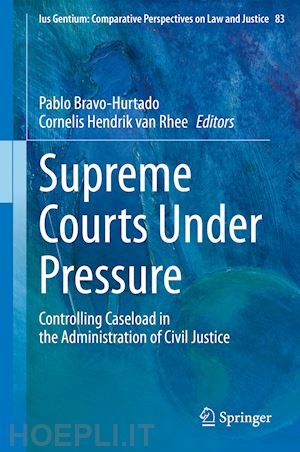
Questo prodotto usufruisce delle SPEDIZIONI GRATIS
selezionando l'opzione Corriere Veloce in fase di ordine.
Pagabile anche con Carta della cultura giovani e del merito, 18App Bonus Cultura e Carta del Docente
This book discusses civil litigation at the supreme courts of nine jurisdictions – Argentina, Austria, Croatia, England and Wales, France, Germany, Italy, Spain and the United States – and focuses on the available instruments used to keep the caseload of these courts within acceptable limits. Such instruments are necessary in order to allow supreme courts to fulfil their main duties, that is, the administration of justice in individual cases (private function) and providing for the uniformity and development of the law within their respective jurisdictions (public function). If the number of cases at the supreme court level is too high, the result is undue delays, which are mainly problematic with regard to the private function. It may also put the quality of the court’s judgments under pressure, which can affect its public and private function alike. Thus, measures aimed at avoiding excessive caseloads need to take both functions into account.
Increasing the capacity of the court to handle larger numbers of cases may result in the court being unable to adequately fulfil its public function, since large numbers of court decisions make it difficult to guarantee the uniformity of the law and its development. Therefore, a balanced approach is needed to safeguard capacity and quality. As shown by the contributions gathered here, the nature of reform in this area is not the same everywhere. There are a variety of reasons for this heterogeneity, ranging from different understandings of the caseload problem itself, local conceptions regarding the purpose of the Supreme Court, and strong entitlements concerning the right to appeal to budgetary restrictions and extremely rigid legislation. The book also shows that the implementation of similar solutions to case overload, such as access filters, may have different effects in different jurisdictions. The conclusion might well be that the problem of overburdened courts is multifactorial and context-dependent, and that easy, one-size-fits-all solutions are hard to find and perhaps even harder to implement.
Pablo Bravo-Hurtado is associate professor of civil procedure at the Catholic University of Valparaíso (PUCV) in Chile and project director of the Centre of Law Artificial Intelligence and Technology of (PUCV). Bravo-Hurtado taught civil procedure and Chilean legal history at the Catholic University of Temuco (Chile) (2010–2013) and comparative civil procedure and European legal history at Maastricht University (Netherlands) (2014–2017), before being appointed at PUCV where he teaches civil procedure and artificial intelligence and law.
C.H. (Remco) van Rhee is professor of European legal history and comparative civil procedure at Maastricht University in the Netherlands and director of the programme ‘Foundations and Principles of Civil Procedure in Europe’ of the Ius Commune Research School. van Rhee taught Roman law at the University of Leiden (Netherlands) (1991-1994) and property and civil procedure at the University of Utrecht (Netherlands) (1994–1998) before being appointed at Maastricht University to the chair of European Legal History and Comparative Civil Procedure.











Il sito utilizza cookie ed altri strumenti di tracciamento che raccolgono informazioni dal dispositivo dell’utente. Oltre ai cookie tecnici ed analitici aggregati, strettamente necessari per il funzionamento di questo sito web, previo consenso dell’utente possono essere installati cookie di profilazione e marketing e cookie dei social media. Cliccando su “Accetto tutti i cookie” saranno attivate tutte le categorie di cookie. Per accettare solo deterninate categorie di cookie, cliccare invece su “Impostazioni cookie”. Chiudendo il banner o continuando a navigare saranno installati solo cookie tecnici. Per maggiori dettagli, consultare la Cookie Policy.